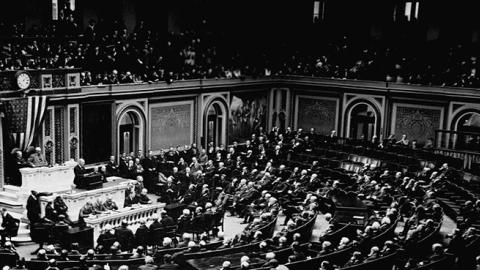On the 11th hour of the 11th day of the 11th month in 1918, the guns were stilled in what was then the bloodiest war in history. A century later it’s worth remembering that while the armistice ended a world war, it also set the table for the next, thanks to the misguided idealism of its author, President Woodrow Wilson.
The Allies had no military reason to stop the fighting. The German army had been badly beaten in a series of battles and was streaming homeward in confusion. The British and French were at the point of exhaustion after four years of constant slaughter, but Gen. John J. Pershing, commander of the American Expeditionary Force, wanted to turn the German retreat into a rout. His forces had taken a bloody nose in the Argonne Forest, but they were still fresh—and growing in numbers. By the start of 1919 Pershing expected to have more than a million men in the field. Completing Germany’s defeat, even advancing to Berlin, would put the U.S. in a position to dictate final peace terms. Germany’s unconditional surrender would allow America to shape Europe in ways that would guarantee Americans soldiers need never die there again.
But Wilson demurred. The president had entered the war pledging “peace without victory.” His objective was to create a new world order. When the new German government sent a note to Wilson on Oct. 4 asking for an armistice, he saw an opportunity to achieve his aims without further bloodshed.
He was flattered that the Germans asked for peace terms based on his own Fourteen Points, which he’d announced in late 1917 as America’s war aims. They included “open covenants of peace, openly arrived at,” a reduction in world armaments, and the establishment of a League of Nations. Convinced that Germany was willing to act in the spirit of democracy and peaceful coexistence, Wilson proposed an armistice. On Oct. 20 Germany formally accepted Wilson’s terms, with the proviso that Kaiser Wilhelm II abdicate his throne.
Wilson did all this over the heads of the British and French, but the cessation of hostilities achieved their aims as well. France wanted to occupy the German territories of Alsace and Lorraine as a security buffer; Britain wanted the German imperial fleet interned. All this could be achieved through negotiations following an armistice. No more French and British boys would die in a war no one had ever wanted.
And so on Nov. 8 French, British and German representatives met to negotiate the formal armistice. Three days later the fighting stopped, although there were more casualties on Nov. 11 than 26 years later on D-Day.
Only one military leader dissented from the armistice agreement: Gen. Pershing. Although in the end he bowed to his commander in chief and his fellow Allied generals, he never gave up his belief that total military victory was the key to lasting peace. “We never really let the Germans know who won the war,” he said in 1923. “They are being told that their army was stabbed in the back, betrayed, that their army had not been defeated. The Germans never believed they were beaten. It will have to be done all over again.”
It was. The armistice spared Germany the final defeat it had earned. Its army remained battered but intact, and the “stab in the back” myth took deep root in the interwar years. It eventually contributed to the rise of Adolf Hitler, who identified the Jews as the perpetrators of the betrayal. America and the world would have to fight yet another, even bloodier war, to prove him wrong.
In “Casablanca,” Maj. Heinrich Strasser disparages Rick Blaine as a “blundering American.” Capt. Louis Renault responds, “Yes, I was with them when they blundered into Berlin.” That was sarcasm: The Americans never reached Berlin in 1918. If they had, the 20th century would have looked very different—and Americans might have learned much earlier the lesson Pershing’s protégé Douglas MacArthur stated best: “There is no substitute for victory.”

















